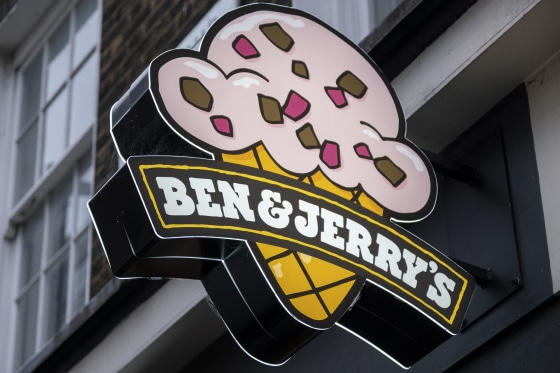Ben & Jerry's is accusing its parent company, Unilever, of firing its chief executive this month over his support for Ben & Jerry’s political activism, the latest development in an ongoing legal dispute between the companies.
The allegation was made in an amended filing Tuesday in U.S. District Court for the Southern District of New York. Ben & Jerry's initially filed a lawsuit in November accusing Unilever of silencing its public statements in support of Palestinian refugees amid the ongoing Israel-Hamas war.
According to the amended complaint, Ben & Jerry's CEO David Stever was fired March 3 after Unilever repeatedly threatened personnel "should they fail to comply with Unilever’s efforts to silence the Social Mission."
The suit also alleges that that was made clear in Stever's most recent review.
Unilever chastised Stever for repeatedly acquiescing to the board "by allowing Ben & Jerry’s to post statements the Independent Board had collaboratively worked on with Ben & Jerry’s management," the suit says.
Replacing Stever for working with the board to promote its social causes "is antithetical to its contractual obligations," the suit says.
A spokesperson for Unilever said in a statement that the acquisition agreement between it and Ben & Jerry's says decisions about appointment and removal of a CEO are made by Unilever "after good faith consultation and discussion."
"Regrettably, despite repeated attempts to engage the Board and follow the correct process, we are disappointed that the confidentiality of an employee career conversation has been made public," the spokesperson said. "We hope that the B&J Independent Board will engage as per the original, agreed process."
Unilever filed a motion to dismiss the complaint Wednesday.
Ben & Jerry's and Stever did not immediately respond to a request for comment Wednesday.
Ben & Jerry's previously sued Unilever after Unilever said it sold the company's business in Israel to a local licensee. That was a blow to the ice cream brand, which announced a boycott of sales in the region in protest of Israel's illegal settlements in the occupied West Bank.
The suit says that as part of the 2022 settlement agreement, Unilever agreed to give Ben & Jerry’s independent board "primary responsibility” over its “Social Mission and Essential Brand Integrity.”
Ben & Jerry’s alleges Unilever violated the agreement on several occasions when it objected when Ben & Jerry's wanted to put out public statements.
One instance described in the lawsuit was in May 2024, when Unilever stopped the Ben & Jerry's European social team from publishing a statement advocating for Palestinians affected by the war to have safe passage out of the war zone.
The lawsuit says Peter ter Kulve, Unilever's president of ice cream, wrote to Ben & Jerry's board chairwoman Anuradha Mittal, on July 1 to express concerns that the message's timing coincided with an Iranian missile attack on Israel.
"When the matter was escalated to me, I expressed concerns about the continued perception of antisemitism that is a persistent issue," ter Kulve's message said, according to the suit.
The suit says Mittal was disturbed by the "false equivalency" and asked ter Kulve whether he had any data to support his opinion, "such as a market study or third-party evaluation. "
"To this day, Mr. ter Kulve has never provided any such evidence," the suit says.
The suit also alleges that Unilever blocked donations to Jewish Voice for Peace and a chapter of the Council on American Islamic Relations.
After repeated requests for objections to be made in writing, Unilever sent a "chart of grievances" and included that it seeks to remain "neutral" on the Palestinian-Israeli conflict, the suit alleges.
According to its motion to dismiss, Unilever decided to exercise its right to deny donations to CAIR and Jewish Voices for Peace after “due diligence” on the organizations. It said the organizations made “inflammatory comments” following the Hamas-led attack on Israel on Oct. 7, 2023.
“Unilever did not want to again be perceived as taking sides on the Gaza conflict and/or associating itself with organizations that supported Hamas’s attack on Israel and its abduction of hundreds of hostages and made highly divisive comments about Israel,” the motion said.
But the lawsuit accuses Unilever of failing to abide by its own alleged neutrality on the issue by donating to an Israeli organization and supporting other causes. The complaint pointed to Unilever's support of Ukrainians after Russia invaded Ukraine, as well as Unilever board member Nelson Peltz's public support of Donald Trump.
Ben & Jerry's alleges that Unilever's interference not only violates the 2022 settlement but has also damaged its brand after decades of social and political activism.
"Ben and Jerry’s customers expect the Company to publicly comment on pressing social issues and expect its highest-ranking officials—including the CEO and the independent Board—to be supportive of these causes," the suit says.
Unilever's motion alleges that Ben & Jerry's has failed to prove damages and that the dispute is a result of the company's directors' "decision to wade into this highly controversial topic without any regard to the negative impact on both B&J’s and Unilever."
"Over time, the social mission of B&J’s shifted, but in recent years it has come to a head as B&J’s seeks to advocate for one-sided, highly controversial, and polarizing topics that put Unilever, B&J’s, and their employees at risk," the motion says.
Unilever denied "muzzling" the board, as "it has hardly been silent."
The motion noted several instances in which Ben & Jerry's has made public comments about the Israel-Hamas war that it said were "one-sided" despite its parent company's "reasonable and prudent calls for balance."
The motion urged for a dismissal for those reasons and because the board has "no standing" to bring about claims on behalf of Ben & Jerry's.
